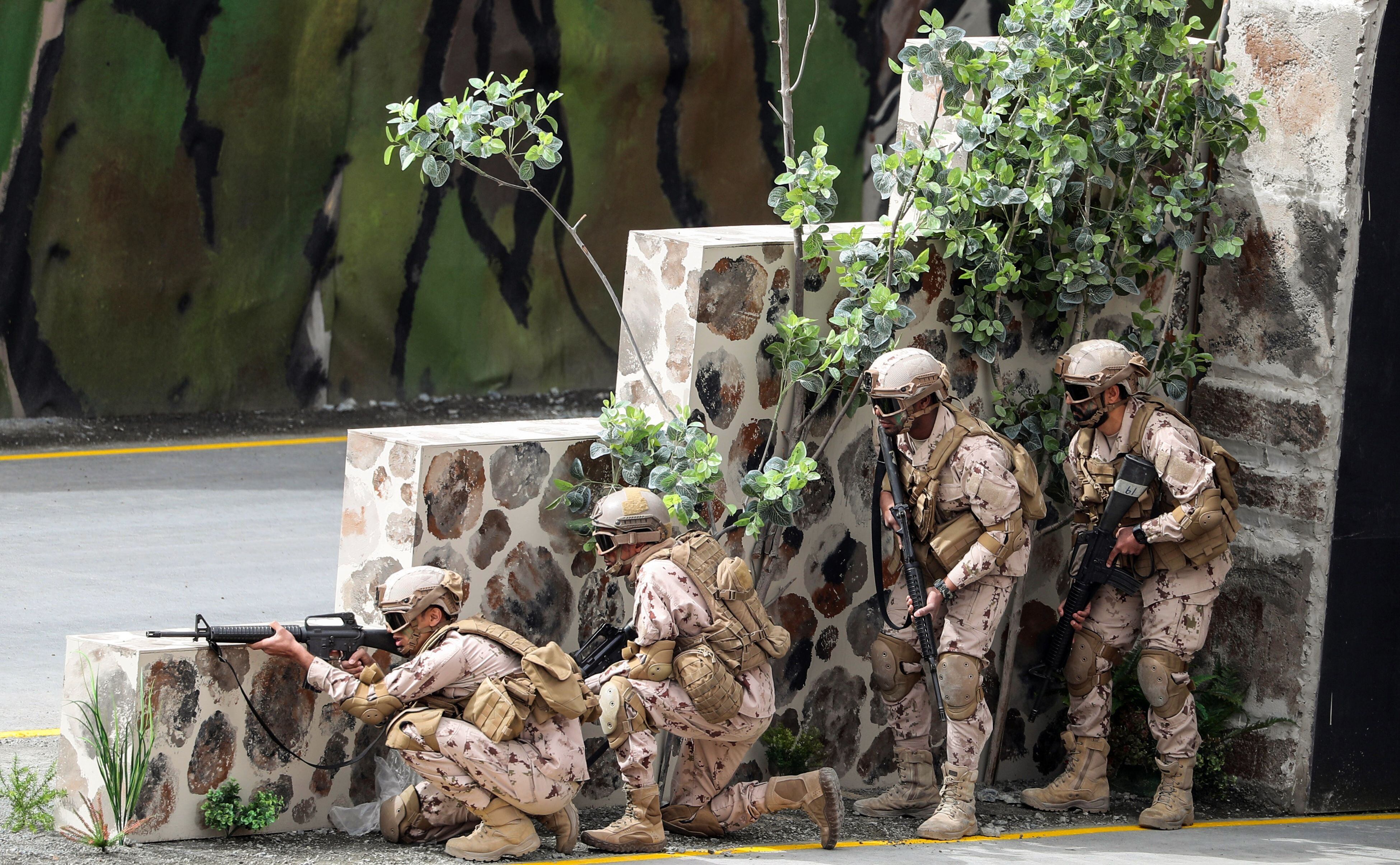During his first international trip as president, Donald Trump announced eye-popping international sales of U.S. military equipment to Saudi Arabia. Nearly two years later, most of the new deals have not turned into official letters of request, much less contracts. While this disconnect has been fodder for more domestic criticism of the president, for long-time observers of Saudi arms purchases the yawning gap between announcements and timely outcomes comes as little surprise.
But as regional military leaders and industry executives gather for the upcoming International Defence Exhibition and Conference, or IDEX, there are signs that the kingdom’s defense-trade apparatus may be ready to clear long-standing backlogs and move more expeditiously in the future. Western firms stand ready to benefit, though not necessarily in the ways to which they are accustomed.
While Saudi Arabia has come under extraordinary international scrutiny in recent months, the kingdom has not relented in its pursuit of Vision 2030 reforms to diversify its economy, particularly by cultivating a domestic defense hardware and services industry.
As with other regional powers ― notably Turkey and India ― Saudi Arabia is no longer satisfied with the traditional vendor-customer relationships that U.S. and European defense firms enjoyed for decades. Going forward, any major defense transaction will require substantial workshare for local firms, participation that goes beyond just touch labor, routine maintenance support and the (occasionally implemented) offset programs of the past. To build a truly indigenous defense industry with a trained workforce, the Saudis will require the handover of significant production and sustainment know-how along with non-trivial technology transfers.
RELATED

A major step toward institutionalizing this shift came in May 2017 when, coinciding with the Trump visit, the kingdom formed the Saudi Arabian Military Industries corporation. Divided into business units covering munitions and land, sea, air and electronics systems, SAMI set ambitious goals to develop new solutions, in-country manufacturing capacity and sustainment services.
The Saudi government also recognized the need for greater government coordination and oversight, forming the General Authority for Military Industries. This organization, separate from the Ministry of Defense, has broad powers over research and development and procurement. GAMI also oversees localization and offset requirements, providing another touchpoint for Western defense firms seeking to navigate the kingdom’s defense landscape.
Faced with this evolving environment, allied governments and global defense contractors have at times struggled with how to adapt and respond. It did not help that both organizations were stood up as de facto shell entities lacking sufficient staffing or leadership.
The delays and inertia caused otherwise cautious and deferential U.S. defense companies to begin sounding the alarm for U.S. government officials to take action. Similarly, a Spanish decision to cancel an unrelated weapons sale to Saudi Arabia last year almost scuttled plans to jointly produce five Avanti Corvettes with SAMI — an effort meant to epitomize the new defense-industrial approach.
By the end of 2017, a seasoned Rheinmetall executive was appointed to lead SAMI, and reports indicate that it has grown increasingly effective in integrating the work of the various Saudi defense companies. Government-subsidized business development entities with relevant aerospace, defense and security divisions (e.g., TAQNIA) are also under pressure to perform or be set aside.
GAMI appears to have recently put the personnel and management in place to move on long-stalled agreements, and put the kingdom’s new industrialization policies into practice. For example, it revised the guidelines for Ministry of Defense acquisitions such that foreign contractors must commit to a localization agreement for at least 50 percent of the value of the contract.
At the same time, the Trump administration has put new emphasis on supporting U.S. arms sales abroad and pushing through changes to the U.S. export control apparatus that has hamstrung the ability of American companies to compete for Gulf business in UAVs and other products. European leaders have likewise renewed their efforts to promote global defense sales.
Overall, the growing sophistication and effectiveness of the kingdom’s defense trade organizations serve as positive news for Western defense companies. The challenge is that the U.S. administration, among others, is also scrutinizing deals more closely to maximize domestic content and employment.
Concurrently, Saudi Arabia is demanding not just a greater local workshare, but longer-term defense-capacity building as well. This will require U.S. and European firms to articulate the “win-win” aspects of these sales to both their Saudi customers and constituencies in governments, legislatures, and the public writ large. Fortunately, in most cases, Saudi jobs will add to, rather than replace, the employment generated by these defense exports.
In contrast, insisting on maximum home country workshare and minimum tech transfer is a guaranteed way of handing major defense contracts to foreign competitors, including those from Russia and China.
So, despite the headwinds, Western companies stand to benefit from the changes underway in Saudi Arabia: more deals pushed through faster, more revenue and greater employment in the defense sector. It comes down to which firms can adapt most quickly to the organizations, processes and business climate that will be the mainstay of Saudi defense trade for the foreseeable future.
Aleksandar Jovovic is principal and Jay Korman is managing director of The Avascent Group, a strategy and management consulting firm serving clients in government-driven industries.








